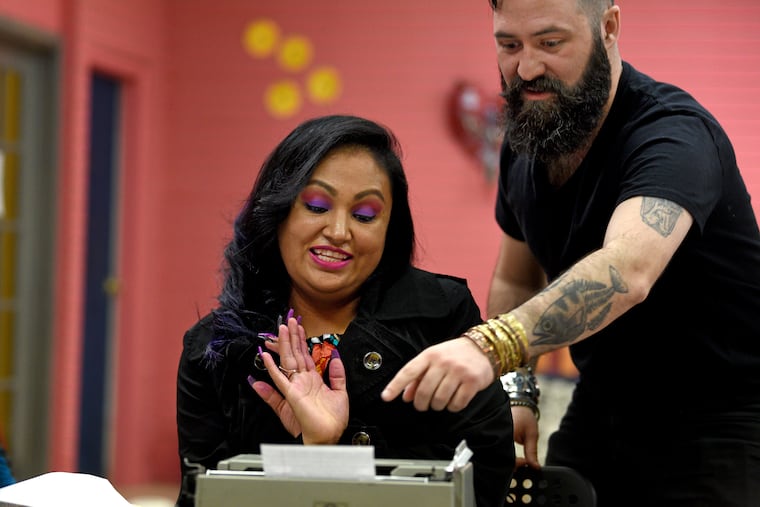Can writing help stop discrimination? An immigrant Philly author believes it can. | Helen Ubiñas
A local author helps immigrants tell their own stories.

The group was swapping stories at the back of the Mighty Writers El Futuro space in the Italian Market on Ninth Street.
They were mothers and fathers, construction and restaurant workers, artists and poets – at least on this night.
They were from Mexico, Guatemala, El Salvador, Ecuador, Colombia. And now, Filadelfia.
>>Haga click aquí para leer este artículo en español.
Some liked to write, others not so much. But even the construction worker, his dark pants dotted with paint, his hands callused, conceded that there was something satisfying about writing down his goal of getting a job, and then crossing it off when he got one.
With local Mexican writer Carlos José Pérez Sámano, 34, leading the informal workshop, they spoke of their native languages and cultures. Some faded long before they made their journey to the United States. A few told of being chided as children to speak Spanish instead of their indigenous dialects — only to come to the United States to be told to speak English, not Spanish.
And then Ivonne Pinto-Garcia, who earlier had exuberantly declared that writing was liberation, shared this:
She’d found herself growing accustomed to feeling inferior in the United States. Afraid to say or do something that might brand her an outsider. Afraid, period. She never realized how much until a man, an American, she told the group, asked where she was from.
“From Puebla,” she said tentatively.
“Wow, it’s beautiful there,” she recalled him saying.
De verdad? she asked suspiciously. “Really?” she repeated, bracing for judgment before he began ticking off all the things he loved: the cathedral, the plaza, the food.
She told the group that in that moment she realized how she had allowed people’s negative perceptions of immigrants to dictate how she felt about herself and her country. And then she felt a rush of something else: pride for where she’d come from and where she was. Of who that journey had made her and so many others who had made similar pilgrimages.
Around the table, the others nodded.
I wasn’t sure what to expect when Sámano invited me to come out to one of the nonprofit Mighty Writers’ bilingual sites that offers free programs for children and their families. Even so, at a time when black and brown immigrants are increasingly being discriminated against and dehumanized, I found myself drawn to a place where they are encouraged to value their origin, their language and their stories.
Where they are empowered to tell those stories themselves.
“I really believe writing can change the world,” Sámano, who moved to Philadelphia from Mexico three years ago, had said when we spoke earlier.
Sámano on writing:
Write to turn painful experiences into art.
Write to turn fear into fearlessness.
Write to stop discrimination.
There it was. I turned to Sámano during a break. This wasn’t just a literary exercise. This was a powerful act of resistance.
He smiled. From his backpack, he pulled out a manual typewriter his aunt had given him. One he’s used for his own work. He invited everyone to take a turn at writing a word, a sentence, whatever moved them.
One woman joked that as a girl she considered going to school to learn how to type, but her mother warned that a new-fangled machine wouldn’t help land a husband. As she slowly pecked at the typewriter, another woman took her photo. This way, she teased, she could tell her mother that she got the man and the machine.
Don’t be shy, Sámano told them. Bang on the keys. Get the words out.
The final product was a beautiful combination of words and phrases and experiences, in English and Spanish:
"Today, here, I found myself and my happy past.
I left my past and come to my future.
The shining moon, it shines in this dark night."
As they said their goodbyes, I stepped outside. The fruit and vegetable vendors were gone for the night, but down the street a neon sign for a taqueria beckoned.